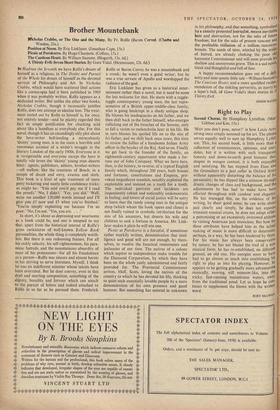Right to Play
Second Chorus. By Humphrey Lyttelton. (Ma Gibbon and Kee, 15s.)
'MAN you don't pose, never !' is how Louis Arm strong once crisply summed up his art. The phrase serves equally well to sum up Humphrey Lyttel' ton. This, his second book, is little more than collection of reminiscences, opinions, and aneL" dotes, but it is written with such transparent honesty and down-to-earth good humour that. despite its meagre content, it is both enjoyable and satisfying. He has stepped from Eton and the Grenadiers to a jazz cellar in Oxford Street without apparently disturbing the balance of hh personality; he has slipped like a minnow through drastic changes of class and background, and the adjustments he has had to make have been effected throughout with candour and elegance He has managed this, on the evidence of hi writing, by sheer good sense; he can write abou jazz clearly and simply, he does not espouse transient musical crazes, he does not adopt either a patronising or an excessively overawed attitude to visiting American jazz musicians. But how far, these attributes have helped him in the actual making of music is more difficult to determine; perhaps, in a way, he has been hindered by than. For his music has always been conservative by nature; he has not blazed the trail of a nevi musical form, he has re-established, on different ground, an old one. His energies seem to have had to go almost as much into establishing ills right to play as into his playing. However, be appears to be getting gradually more adventurous musically, moving, still minnow-like, into the tricky, fast-running mainstream waters, away from the traditional pond. Let us hope he con- tinues to supplement the blown with the written word.
RORY MCEWO


































 Previous page
Previous page